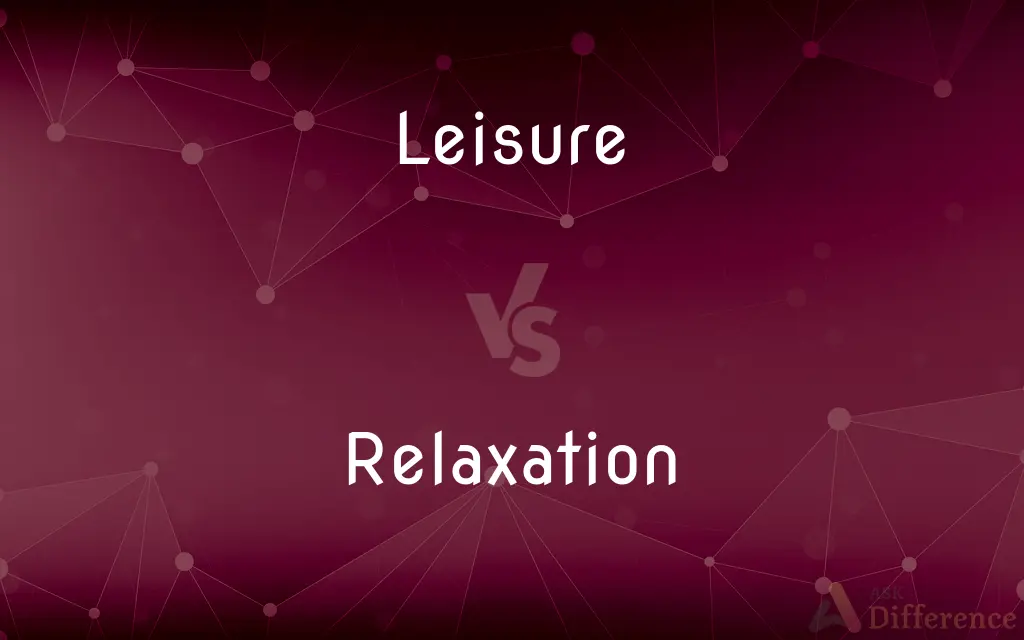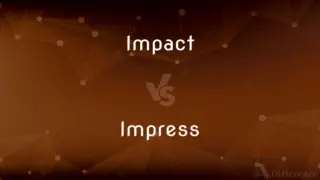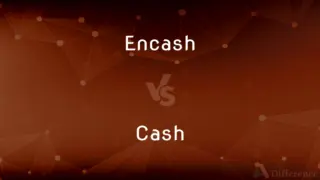Leisure vs. Relaxation — What's the Difference?
By Fiza Rafique & Maham Liaqat — Updated on March 13, 2024
Leisure refers to free time spent away from work and duties, while relaxation is the state of being free from tension or anxiety.

Difference Between Leisure and Relaxation
Table of Contents
ADVERTISEMENT
Key Differences
Leisure is the time allocated for activities of choice, not bound by obligations, often encompassing hobbies, entertainment, and social activities. In contrast, relaxation is a state or process that involves reducing stress and physical tension, which can occur within leisure activities or separately.
While leisure activities can vary widely from active pursuits like sports to passive engagements like reading, relaxation specifically aims to soothe and calm the mind and body, often through practices like meditation or simply resting.
Leisure time is characterized by its voluntary nature and the freedom to engage in preferred activities, offering a break from routine or work. Relaxation, however, focuses on the physical and mental process of unwinding and is not necessarily tied to leisure time alone.
Engaging in leisure can lead to relaxation, but not all leisure activities are relaxing, as some might be exhilarating or physically demanding. Relaxation techniques, on the other hand, are specifically designed to relieve stress and promote calmness.
Comparison Chart
Definition
Free time spent away from work and obligations.
State of being free from tension or anxiety.
ADVERTISEMENT
Purpose
To engage in activities of choice for enjoyment or fulfillment.
To reduce stress and physical tension, promoting calmness.
Activities
Can range from active to passive pursuits.
Involves practices that soothe and calm the mind and body.
Characteristics
Characterized by voluntary engagement and preference.
Focuses on the process of unwinding mentally and physically.
Outcome
Provides a break from routine, potentially leading to relaxation.
Specifically aims to relieve stress and promote a sense of peace.
Compare with Definitions
Leisure
Engaging in activities by choice, not obligation.
His leisure activities include hiking and bird-watching.
Relaxation
The state of being free from tension or anxiety, often achieved through specific practices.
Yoga and meditation are key parts of her relaxation routine.
Leisure
Time free from work or duties, available for rest and enjoyment.
She spends her leisure time gardening and reading.
Relaxation
Focused on reducing mental and physical stress.
Deep breathing exercises are effective for immediate stress reduction.
Leisure
Pursuits that bring personal joy and fulfillment.
Pursuing music has always been his favorite leisure activity for personal fulfillment.
Relaxation
Involves the physical process of easing tension in the body.
A warm bath in the evening can be a perfect relaxation technique to unwind.
Leisure
Offering a necessary break from the demands of work and daily routines.
Weekends provide the leisure time needed to recharge from the workweek.
Relaxation
Aiming to promote a sense of peace and calm in the mind and body.
Listening to calming music is a simple way to aid relaxation.
Leisure
Encompasses a wide range of interests from active to passive.
Leisure interests can range from sports and travel to quiet contemplation.
Relaxation
Encourages a peaceful and tranquil mental state.
Visualization techniques can transport the mind to a state of relaxation and tranquility.
Leisure
Leisure has often been defined as a quality of experience or as free time. Free time is time spent away from business, work, job hunting, domestic chores, and education, as well as necessary activities such as eating and sleeping.
Relaxation
The act of relaxing or the state of being relaxed.
Leisure
Free time when one is not working or attending to other duties.
Relaxation
Refreshment of body or mind; recreation
Played golf for relaxation.
Leisure
Relaxation or activities engaged in during such time
The pursuit of leisure.
Relaxation
A loosening or slackening.
Leisure
Freedom provided by the cessation of activities.
Relaxation
A reduction in strictness or severity.
Leisure
Free time, time free from work or duties.
Relaxation
(Physiology) The lengthening of inactive muscle or muscle fibers.
Leisure
Time at one's command, free from engagement; convenient opportunity; hence, convenience; ease.
Relaxation
(Physics) The return or adjustment of a system to equilibrium following displacement or abrupt change.
Leisure
Freedom from occupation or business; vacant time; time free from employment.
The desire of leisure is much more natural than of business and care.
Relaxation
(Mathematics) A method of solving equations in which the errors resulting from an initial approximation are reduced by succeeding approximations until all errors are within specified limits.
Leisure
Time at one's command, free from engagement; convenient opportunity; hence, convenience; ease.
He sighed, and had no leisure more to say.
Relaxation
The act of relaxing or the state of being relaxed; the opposite of stress or tension; the aim of recreation and leisure activities.
Leisure
Unemployed; as, leisure hours.
Relaxation
A diminution of tone, tension, or firmness; specifically in pathology: a looseness; a diminution of the natural and healthy tone of parts.
Relaxation of the soft palate
Leisure
Time available for ease and relaxation;
His job left him little leisure
Relaxation
Remission or abatement of rigor.
Leisure
Freedom to choose a pastime or enjoyable activity;
He lacked the leisure for golf
Relaxation
Remission of attention or application.
Relaxation of efforts
Relaxation
Unbending; recreation; a state or occupation intended to give mental or bodily relief after effort.
Relaxation
(physics) The transition of a nucleus, atom or molecule from a higher energy level to a lower one; the opposite of excitation
Relaxation
(music) The release following musical tension.
Relaxation
The act or process of relaxing, or the state of being relaxed; as, relaxation of the muscles; relaxation of a law.
Relaxation
Remission from attention and effort; indulgence in recreation, diversion, or amusement.
Relaxation
(physiology) the gradual lengthening of inactive muscle or muscle fibers
Relaxation
(physics) the exponential return of a system to equilibrium after a disturbance
Relaxation
A state of refreshing tranquility
Relaxation
An occurrence of control or strength weakening;
The relaxation of requirements
The loosening of his grip
The slackening of the wind
Relaxation
Freedom from activity (work or strain or responsibility);
Took his repose by the swimming pool
Relaxation
A method of solving simultaneous equations by guessing a solution and then reducing the errors that result by successive approximations until all the errors are less than some specified amount
Relaxation
The act of making less strict
Common Curiosities
What are some examples of leisure activities that may not be relaxing?
Activities like rock climbing, marathon running, or engaging in competitive games can be leisure activities that are exhilarating or physically demanding rather than relaxing.
Can relaxation occur without leisure?
Yes, relaxation techniques can be practiced even outside of leisure time, such as taking short breaks at work to meditate or breathe deeply.
Are all relaxation activities considered leisure?
While many relaxation activities can be part of leisure time, some relaxation techniques may be practiced as part of a routine, like stress management during the workday, and not necessarily considered leisure.
What role does relaxation play in work-life balance?
Relaxation is crucial in maintaining a healthy work-life balance by providing mental and physical recovery from work-related stress, enhancing productivity and satisfaction.
Is leisure time always relaxing?
Not necessarily. Leisure time is about engaging in preferred activities, which might not always be relaxing, such as participating in competitive sports.
How can leisure activities contribute to relaxation?
Leisure activities that are enjoyable and stress-free can naturally lead to relaxation by reducing anxiety and promoting happiness.
How does relaxation benefit health?
Relaxation can lower stress levels, reduce blood pressure, improve sleep quality, and enhance overall well-being, contributing to better mental and physical health.
Can leisure activities be harmful to relaxation?
If leisure activities become overly stressful, competitive, or time-consuming, they might detract from relaxation, leading to increased tension or anxiety.
Can technology aid in relaxation during leisure?
Yes, technology can aid relaxation with apps for meditation, music for relaxation, or virtual experiences that promote calmness, though it's important to balance screen time for overall well-being.
How do people choose leisure activities for relaxation?
People often choose leisure activities for relaxation based on personal interests, stress levels, and the need for a break from routine, seeking activities that bring joy and calm.
Share Your Discovery

Previous Comparison
Impact vs. Impress
Next Comparison
Encash vs. CashAuthor Spotlight
Written by
Fiza RafiqueFiza Rafique is a skilled content writer at AskDifference.com, where she meticulously refines and enhances written pieces. Drawing from her vast editorial expertise, Fiza ensures clarity, accuracy, and precision in every article. Passionate about language, she continually seeks to elevate the quality of content for readers worldwide.
Co-written by
Maham Liaqat












































